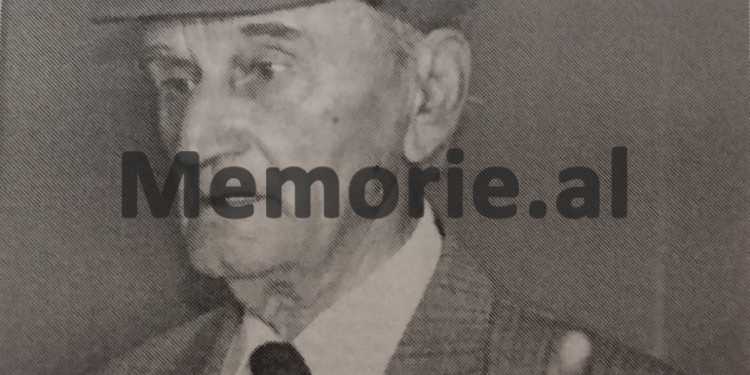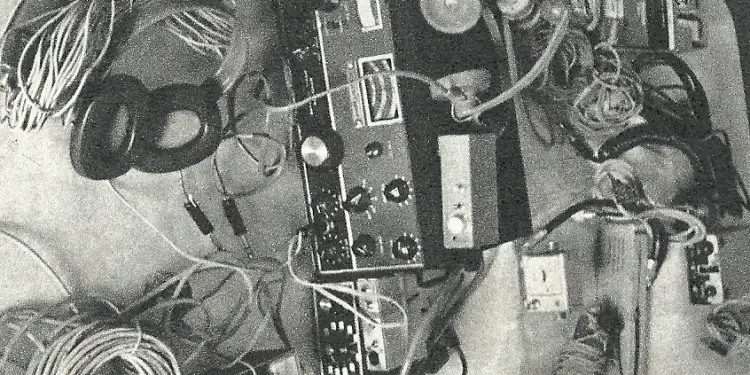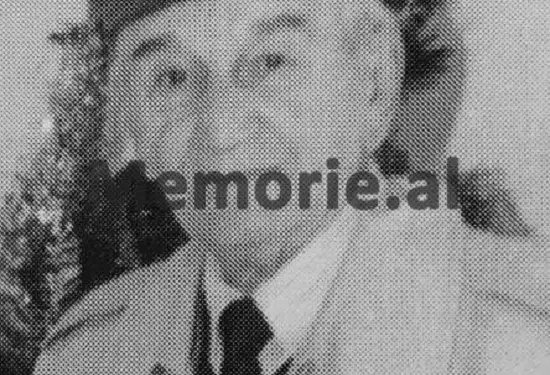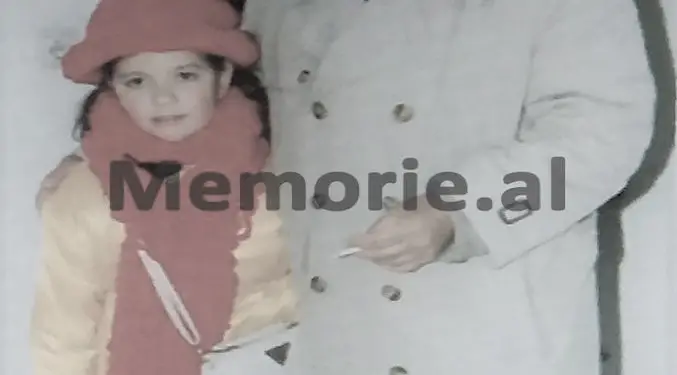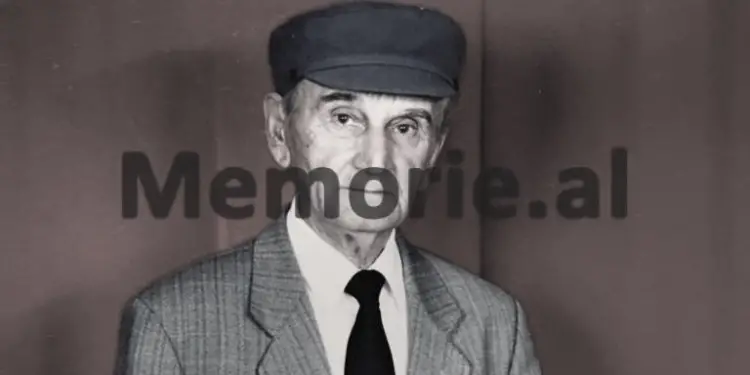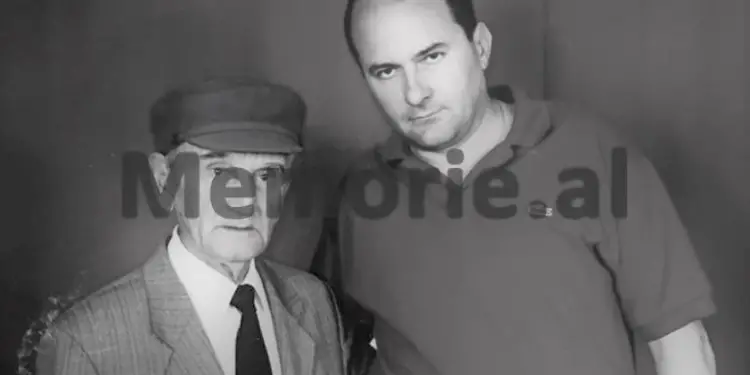Dashnor Kaloçi
Part six
Memorie.al publishes the unknown and rare story of Avdul Hakan Banushi, originally from the village of Golem in Gjirokastra, who during the occupation of the country (1939-1944), unlike his entire family who joined the forces partisan, he joined the nationalist youth organization “Balli Kombëtar” in the city of Durrës, where he was arrested by German forces in October 1943 and together with 73 other people, were initially sent to the German camp in Prishtina, and then to the mass extermination camps at Landesberger and Dakau, from where he could only be released in 1945, after the intervention of Anglo-American forces. Banushi returned to Albania in 1945, after staying for some time in the Reggio-Emilia camp in Italy, (where at that time were also some of the main leaders of ‘Balli’ and ‘Legality’ led by Mit’hat Frashëri and Abaz Kupin) and his arrest a few days after arriving home, after at the Lapraka airport, partisan guards found a letter given to him by the former Prefect of Gjirokastra, Rasim Babameto, while they were in Reggio-Emila. Banush was sentenced to 18 years in prison, accused of being an “agent of the Anglo-Americans” and released in 1961, where he did not spend much time with his family in the village of Golem, after being arrested again while interned in the town of Fier, from where he managed to escape from prison the first night and fled in the direction of Gjirokastra, where he crossed the state border and went to Greece, where he soon gained political asylum in the United States. Banushi’s engagement in the ranks of the Albanian political diaspora in the West, as a member of the “Free Albania Committee”, where in 1973, after being trained by the CIA, he came several times with secret missions to Albania, in order to carry out assassinations Enver Hoxha in the big parade of November 29, 1974, on the occasion of the 30th anniversary of the liberation and his arrest in 1975 near the border of Hani i Hotit, after a trap set by the Minister of Internal Affairs, Kadri Hazbiu , from where he would then be isolated for two years in the cells of ‘Ward 313’ in Tirana Prison and then in Burrel, from where he could only be released in early 1991.
“When the first contradictions of official Tirana with the People’s Republic of China started in 1972-’73, we became even more confident that the time had come to organize concrete measures for a possible landing in Albania. After talks between the leaders of the “Free Albania” Committee and Mr. Joseph Shisko, Deputy Secretary of State, and Major Thomas Smith, who covered Albanian political emigration to the United States, in January 1974, the presidency of the organization “Albanian Anti-Communist Resistance Front” decided to send to Albania the first group, which would consist of five people. Among the main tasks that the group would perform were: ‘Meetings with people dissatisfied with the communist regime, the demolition of the Stalin and Lenin monument in the center of Tirana, the blowing up of the headquarters of the Central Committee of the ALP, the distribution of anti-communist propaganda materials, which had been prepared in New York, etc. It was decided that the first group would be led by me, as I was acquainted with the contingent of families persecuted by the communist regime, where we would initially rely. In addition to me, this group also included: I. Rrushiti, N. Banushi, I. Lame and A. Sula. After some intensive preparations we made on a secret basis, we finally set off on the plane that would traverse the route: New York – London, – Amsterdam – Rome – Athens. When we arrived in the Greek capital, we took refuge in the Hotel “Atlantik” and the next day we went to the military base of Preveza, where the colonel who was waiting for us supplied us with weapons consisting of five automatic weapons, five pistols, 20 grenades, 6 kg dynamite, capsules and mechanical devices for their detonation, swimwear, a radio transceiver, as well as many other ammunition and equipment. After arranging these in a safe place, I talked to the colonel about the possible routes we had to follow to enter Albania and at seven o’clock in the evening we set off in a small speedboat run by three sailors and after a few hours we arrived in the coast of Ksamil”.
This is how Avdul Hakan Banushi, originally from Golem, Gjirokastra, remembered the beginning of the “Albanian adventure”, who told us for the first time some of the most sensational events of his life, which took place in 1974 – ’75, when he, at the head of a commando group launched by the United States of America, entered Albania several times with secret missions.
Who was Avdul Banushi and what is his past? Why was he interned in the Nazi concentration camp in Dakao, Germany, and how did he manage to escape? How did he return to Albania in October 1945 and why was he sentenced to 18 years in prison, being accused of being an agent of the Anglo-Americans? How did he manage to escape from the Fier Branch of Internal Affairs in the first days of August 1961 and how did he cross the border into Greece? What was asked of him in Athens and how did he gain political asylum in the United States?
Who were the Albanian anti-communist leaders who organized the “Throne of Anti-Communist Resistance” and why did the “Albanian adventure” of Abdyl Banushi and the assassination of Enver Hoxha in the big parade of the 30th anniversary of the liberation on November 29, 1974 fail? Who was the man who accompanied and betrayed Abdyll Banushi on his last mission in Albania, which caused him to fall alive into the hands of the Albanian border forces near Hani i Hotit, from where he would be isolated in the horrific Burrell prison, until the fall of the communist regime in 1991? Regarding these and many other events and facts, we know the exclusive interview given to us by Mr. Banushi, a few years ago, which will be in six numbers in a row.
Continued from the previous issue
Mr. Banushi, where did you go after leaving the village of Savër?
Before dawn, we entered the city of Lushnja and went to Ç. Godos, whose father, Isa Godo, a former officer of the Zogu Gendarmerie, had fled Albania in 1953 and settled in Brussels, where he continued to be part of our organization. Ç. Godo received us at his house with great fear, but refused to go out to inform the other persons we were looking for, telling us that he was afraid that among them there might be people infiltrated by the State Security. After leaving his house, we split into two groups and arrived in Durrës with the Cerloi family. She was a family of merchants, and despite all the dangers that lay ahead, she welcomed us very warmly. After three days they agreed to hold a meeting there and after we created the new cell, we left for Tirana. After staying a few days in Tirana, we took the road back to the South of Albania and from Mount Bureto, we continued towards the state border with Greece, crossing it in the midst of many dangers and then we traveled to Ioannina and then to Athens.
What did you do next?
From Athens we flew to France, where for a few days we stayed at our permanent hotel, “Viktor Hygo”, where we had some conversations and debates with Sadik Friday and Seit Kryeziu. Then we moved to Belgium and Germany, where we met other Albanians in the anti-communist diaspora and then returned to the Italian capital Rome.
Why did you make all these moves?
These moves were part of our tactics, before we entered with a mission to Albania, to disorient the State Security in Albania. The effect of these movements was the loss of traces from the pursuits of the Albanian Intelligence that had his collaborators in almost all countries where there were Albanians.
From Rome where did you go next?
From Rome, Tom M. and I set off by train to the city of Bari, carrying ten pounds [10 kg]. propaganda materials, not including the weapons for four people, which we would distribute in Albania. From the port of Bar we left with the ferry “Iliria” to the port of Dubrovnik in Yugoslavia. For the passage of materials and weapons that we had with us, we had the greatest dangers in the controls that were done through the ports, or border crossing points, which in the Balkan countries were stricter.
Did you have any problems when entering the port of Dubrovnik?
Knowing that Thomas was young and inexperienced, I let him go ahead and the materials we had, I came out on my own for god. I gave the police officer who started checking me $ 100 in hand and after seeing my American passport, he allowed me to pass without checking me anymore. Then we left the port and took a taxi which took us to the city of Titograd, which was 700 km. far from there. We arrived in that city at ten o’clock in the evening of April 2, 1975, and as soon as we got out of the taxi, we felt quite safe from the great vicissitudes we had gone through, because there lived Tom M.’s family which was considered one of the bases our safest.
Did you go to that base?
Of course, as soon as we got off we immediately went to Thomas’s house, where I met all the family people. I wanted to say that the reception I received there was somewhat cold. As we sat down to eat, I noticed a lot of movement of people coming and going. Especially Toma’s brother, Deda, came in and out and in one case all the family members came out leaving me alone.
Were there any doubts about the cold reception reserved for him in that house and the movements you say?
To be honest it caused me some surprise, but to suspect that I was in front of a trap, I never thought about it. However, I asked them about their concern, what was wrong with them and they told me that there was a mess, about Deda’s marriage. Then we fell asleep. I slept with Tom in a room overnight, I had a terrible dream, as if a border dog attacked me to bite me, and I immediately got up sitting down. Toma felt my movement and asked me what I had and I told him the dream.
When did you leave to enter the Albanian border?
On April 7, 1975, at ten o’clock at night, a taxi came and picked us up and we left for the Yugoslav-Albanian border.
Who accompanied you there?
Together with me and Toma, his brother Deda came to accompany us, and their father Gj., Who were part of our group that would enter Albania. On the way to the border, the taxi took a blind mountain road and they told me there was no other way to where we were going. We showed the taxi driver a house on the edge of the border, to create the alibi, and after we paid him, he left. As soon as we got off, we started talking about how we could cross to enter Shkodra.
Have you ever been to those parts, that is, have you ever crossed that border area to enter Albania?
No, for me it was the first time I stepped on those sides, but the decision we were going to get there had already been made in New York, because it was Toma from those sides and he knew the place by hand, while as the group leader was me.
Where did you decide to cross to enter the Albanian territory?
We continued our way down the hill to get out near the national road near Hani i Hotit. While we were descending, there I told Toma, Deda and Gj. To check the weapons, because they were automatic weapons of the German brand “Schneiser” and we had not used them before. I told them to let me check them and after they gave it to me, I locked them with a gear, placing the three numbers in a line. After that, I gave it to them, telling them that they were fine.
Why did you block their weapons?
I did that because while we were going down the hill, Toma talked to Deda, secretly to me, which made me doubt.
What happened to you next?
As we were traveling towards the Albanian border and had entered about 800 meters inside the Albanian land, we noticed the buildings of Hani i Hotit post office, inside the wires of the clone. There Gj., Sat down to rest and smoke a cigarette, saying that he was tired. I wanted to oppose him, but at that moment Deda and Toma also sat down, introducing me between them. I pulled out the pack of cigarettes and as I was lowering the chain of the t-shirt, to pull out the lighter, I felt Thomas coming from behind me to light his cigarette.
Did you not doubt at all the movements and actions they were doing?
I was skeptical, but it was a matter of seconds and when I tried to light a cigarette, I felt a strong blow to the face and head. Immediately I fell to the ground dazed and as if in the fog I noticed Deda e Gj., Who approached me and hit me on the neck with the cities of automatic weapons. Even in those conditions when my feelings had not yet completely left me, I managed to pull the pistol out of my belt and fired randomly several times, without seeing where they were.
What happened next, were your gunshots heard?
Shortly afterwards from the nearby border barracks, soldiers immediately came and kicked and punched me all over my body, until I lost consciousness.
When you were mentioned, where were you?
I was only mentioned in the Shkodra Branch of Internal Affairs when I was being treated.
What happened to Toma, Deda e Gj.?
While they were treating me in the Internal Affairs Branch of Shkodra, I noticed that Deda and Toma were also there, and they were even tied behind chairs. Gj., Was not there, he had returned back to Han i Hotit.
How do you explain this, so why did that thing happen to you… ?!
The game played by the State Security and personally the Minister of Internal Affairs, Kadri Hazbiu, with me, had to continue until the end. They had arrested them in order not to deconstruct them as their agents and to let me know, that I had not been hit by them, but by the border soldiers and that they had allegedly been arrested just like me. While Gj., Returned because he played a triple game, with the Albanian Security, with the Americans and with the Yugoslavs.
But in your opinion, was the trap set by the people of the State Security successfully realized?
No, because from what I could learn years later, the three of them had no orders to shoot me. The task they had received from the State Security was only my surveillance and to report on the movements I made in different European countries, while when I entered Albania, my arrest would be made only by the people of the Ministry of Interior. So the agents recruited by the State Security shot at me without the authorization of their superiors.
What happened next to you, from the Shkodra Branch where you were taken?
On April 8, 1975, from the Shkodra Branch of Internal Affairs, I was escorted by four police cars and sent to Tirana, where I was placed in the ‘Old Prison’ (Rep. 313) in cell No. 39. There I was laid with a straw mattress on the floor and leaning against the wall, there were also two employees of the Ministry of Interior with great physique. Shortly afterwards, the prison commander, H. Shehu, entered, accompanied by an entire suite, who looked at me for a moment without speaking, as if looking at a prehistoric animal alive in a zoo. I could barely distinguish them vaguely from the pain that did not stop me and then, I fell again unconscious.
When and who was questioned as a start?
From the first day I was mentioned, the two civilians standing in my cell took me with a blanket over my head and led me somewhere. When my blanket was removed, I found myself in a furnished room, where two men in their forties were sitting. One of them, after inviting me to sit down, addressed me: “You became famous mor jahu, you behaved a lot with tajare viu-viu, but I had done it, Mr. Avdul Banushi. I would not let you go without shooting me. “You are brave and brave, no one denies this, but in the end you were a fool. You had forgotten that the Trojan horse, we have it too”.
Who was the one talking to you?
I did not know him, but as he spoke to me, I, to show that I was calm, sat down in the chair and put my foot on the floor. At that moment, the man who had spoken to me first, jumped out of his chair and shouted at me: “Sit down, because here you are in front of the Minister….” At that moment I realized that I was in front of Kadri Hazbi and Rexhep Kolli, who spoke dialect tiranas.
What else did they say to you?
While Rexhep Kolli was shouting at me that I was standing on my feet, Kadri Hazbiu said: “Leave it, leave it, American education is enough”. Then he told me that I would be called Rexhep Kalemi and only with that name I would respond to those who would accompany me to the room, otherwise I would have a bad job. I was also told that they would give me a pack of ‘DS’ tobacco a day and a coffee. Then they gave the order to take me and Ferhat Matohiti, the Chief of Investigation of the Ministry of Interior, accompanied me to my room, where they had made big changes. They had brought cotton mattresses and white sheets, brand new. Then, they took me again and took me to the same room, where the First Deputy Minister of Internal Affairs, Feçor Shehu, interrogated me, saying: “You must open your heart to the Party and Comrade Enver, that he makes it easy for people to be honest. ”When he finished asking, they took me back to my cell, where big changes had been made.
What changes… ?!
There were no longer two cotton mattresses and they had placed an open coffin, laid inside with a quilt. The coffin was one meter and seventy centimeters long, seventy centimeters wide, and eighty centimeters deep. It was placed in the center of the room, while on the right arm, there was a table and a chair for my companion. On the table was a sampisite suit, while on the other side stood a man who, as I later learned, was the head of the Ministry of Internal Affairs, Nevzat Vigani, who looked like a copy of Stalin.
What was that coffin and why was it brought there?
The coffin was an old method that the Ministry of Interior of Albania had borrowed from the Soviets. , wanted a few minutes. In that coffin, I was kept in chains and a diving suit on my head for 13 months and eight days, in which I remained in that cell during the interrogation.
What were you asked about during the investigation?
For everything, from the meeting of Madrid with Leka Zogu, all my activity, which they knew, but asked me to tell and testify with my mouth. During the investigation, I was confronted several times by Tom M., and his wife P., who had been brought to the US, who testified about my activity.
Did you agree with what they were asked?
“Throughout the investigation, I did not accept anything and I was left with the first word that I had allegedly come to Albania for the first time”.
When were they tried?
On May 2, 1976, my investigator Dhimitër Beshiri, with his two assistants, brought me the clothes I was going to appear in court and barber H. Karai shaved and shaved me for the first time in 13 months. The trial against me continued in two hearings on 13 and 14 May, chaired by Eeleni Selenica, President of the Court and Prosecutor Edmond Sanxhaktari. The accusation against me was: “Crimes against the state, terrorist acts, provocations to sever Albania’s diplomatic relations with other countries, participation in armed gangs, terrorist acts against foreigners and agitation and propaganda.” Based on the seven articles that caught me on these charges, I was sentenced to 25 years in prison, confiscation of property and loss for five years of electoral rights.
Where did you serve your sentence and when were you released from prison?
I served my sentence in Burrell Prison and was released on March 17, 1991, the last prisoner to be released following protests by the Helsinki Committee.
How much prison did you do in total?
In Albania I spent 31 years and three months, while the other two years I suffered in the Nazi camps of Pristina, Landsberger and Dakau, ie 33 years and three months in total.
Why do you think you were not shot when you were accused of terrorist acts and while you were in prison did you get offers to work for the State Security?
I was not shot, not because the bullet hurt, but maybe I needed them alive and they hoped to break me. For this, the Head of the Intelligence Branch, Hasan Luçi, came to me in Burrel prison and proposed that I be put in the service of Albania, of course the State Security.
How did you respond?
I not only refused, but told him that: if I came out alive from there, I would still try to drop bombs on them at the Central Committee in Tirana. After that, Hasan Luçi left, but apparently he did not report to me what I told him, otherwise I would have been re-convicted back in prison.
Have you regretted that you spent your whole life in prison?
Not at all, I had consciously entered that path since the age of 16 and I feel proud of my past as an Albanian and everything else I have done against the dictatorial regime of Enver Hoxha./Memorie.al




